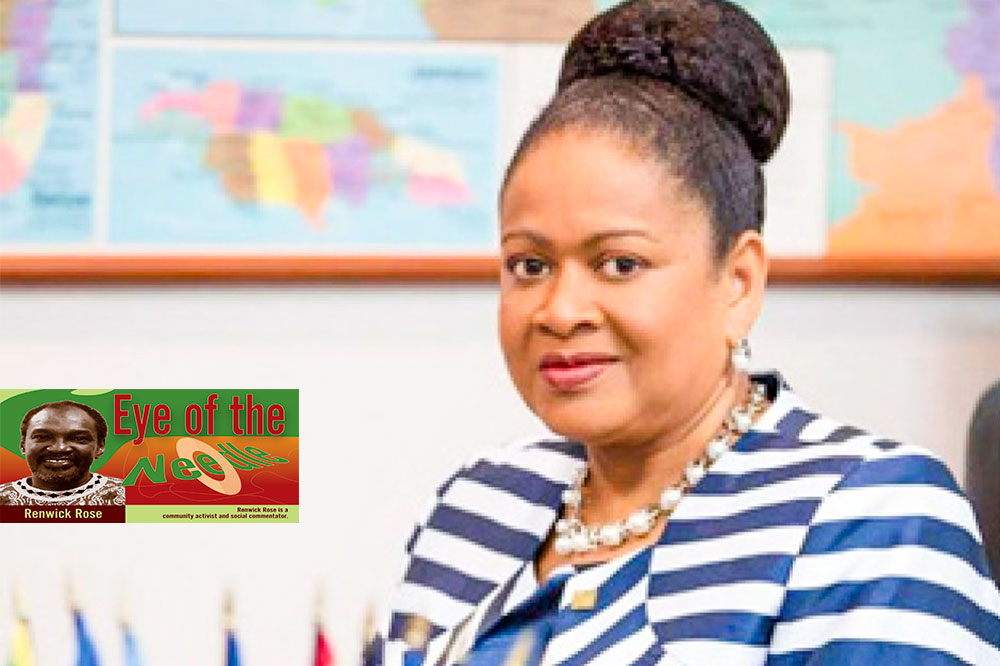
R. Rose – Eye of the Needle
When will Caribbean people, and their governments give higher priority to the international demand for reparations for transatlantic slavery and colonial plunder?
This question is a most relevant one even as the United Nations Permanent Forum on People of African Descent holds an important meeting in
Geneva, Switzerland this week. The meeting is being attended by delegates from most Caribbean nations, including St Vincent and the
Grenadines. It is also of special significance to this region because on Tuesday April,16, noted St Lucian diplomat, Dr June Soomer, was sworn in as the Chair of that global body.
The Caribbean is one of the regions of the world which have suffered most from the inhuman trafficking in African slaves, genocide against its indigenous people and the ravages of colonialism. It stands to reason then that Caribbean states have been in the forefront of the demands for reparations. It has led to not only vocal representation in international fora but also the establishment of a Caribbean Reparations Commission, launched in grand style in Kingstown last August.
Despite this auspicious launching and excellent advocacy work mainly by leading Caribbean intellectuals, it is true to say that while in general there appears to be support for the initiative, we have a long way to go in the Caribbean to get wholehearted commitment by most of our people for this necessary goal. While many people broadly support the cause, there is still a lot of doubt as to whether such an initiative can succeed; while among a minority, the old colonial hangover influences some not to give support.
As a result, the campaign has largely been advanced by the intellectuals who lead the movement, and when it is opportune, by some regional Heads, our own being prominent in this regard, with solid support among the more progressive young people and persons associated with the Rastafarian movement. The work of the Caribbean Commission has, however, been rather uneven reflecting the varied nature of the work in the respective territories.
It appears, to me at least, that there is over-reliance on a top-down approach. The selective nature of the leadership in several countries has tended to lean towards those with “connections” to the parties in government. In addition, sadly, it seems that some leaders are themselves not clear about what reparations is all about and the onerous nature of the tasks they have undertaken. One cannot confuse form with substance. Grand pronouncements and the outward trappings of Africanism are quite in order, but the hard work must be done.
One hundred years ago, the Venerable Marcus Mosiah Garvey built an international movement influencing millions of black people, many of them uneducated, around the issues of reparations and Back-to- Africa repatriation. If he could do it then, why not us in a modern era with all the modern tools of communication at our disposal?
We must ground the education, among the people who have suffered most and are still suffering in poverty. In addition, while education at tertiary and secondary school levels is absolutely required, our children are the only guarantors of continuity. The reparation message must be transmitted simply, in all forms so that as many people as possible can understand and be converted,
we must work in all corners and can only do so when we understand our calling. A mass movement for reparations is an absolute necessity.
The international movement linking Africans in the western hemisphere with their brothers and sisters in
Africa, raised the reparations flag at an important United Nations Conference held in the South African city of Durban more than 20 years ago (2001). That conference adopted the Durban Declaration of Action, a comprehensive blueprint to address racial discrimination, including effective measures to achieve reparations. That Declaration was adopted by the General Assembly of the United Nations in 2002.
More than two decades later, what has been achieved, whether in Africa or the Caribbean as far as this programme is concerned? It seems that we are good at all the fine speeches and the “flam”. Leadership of such a movement as reparations calls for sacrifice and toil and doing the hard work for delivery. There is no glory in it and all too many among our own people are too quick to criticize and even condemn. We cannot let the negative stand in our way.
There are positive possibilities. The growing tide of the hemispheric indigenous peoples’ movements is a source of inspiration. Just last week, out of Jamaica a group of people who identify themselves as descendants of the Taino or Arawak people, made a public call for official recognition of their people and the Maroons, descendants of former African slaves who had taken to the hills in Jamaica and today still constitute a community.
They claimed that a process of recognition has been stalled since 2022 which aimed at actions by the State to help the indigenous people (both) to situate themselves within Jamaica’s history and to engage in the full practice of their culture and self-determination.
Indigenous communities like these and similar ones in Guyana and Suriname must also be involved in the just claim for reparation.
The ground is fertile, but it needs ploughing, fertilizing and care for it to grow, flower and bear fruit. This cannot be about grandstanding and glory; it is our historical duty. We can take inspiration from Sis. June Soomer who has promised to “relentlessly advocate for reparations as there can be no sustainable development without reparations”. As Chair of the Permanent Forum, she has pledged, “We will not be quiet. We will not be invisible. We will not disappear”.
- Renwick Rose is a community activist and social commentator.


